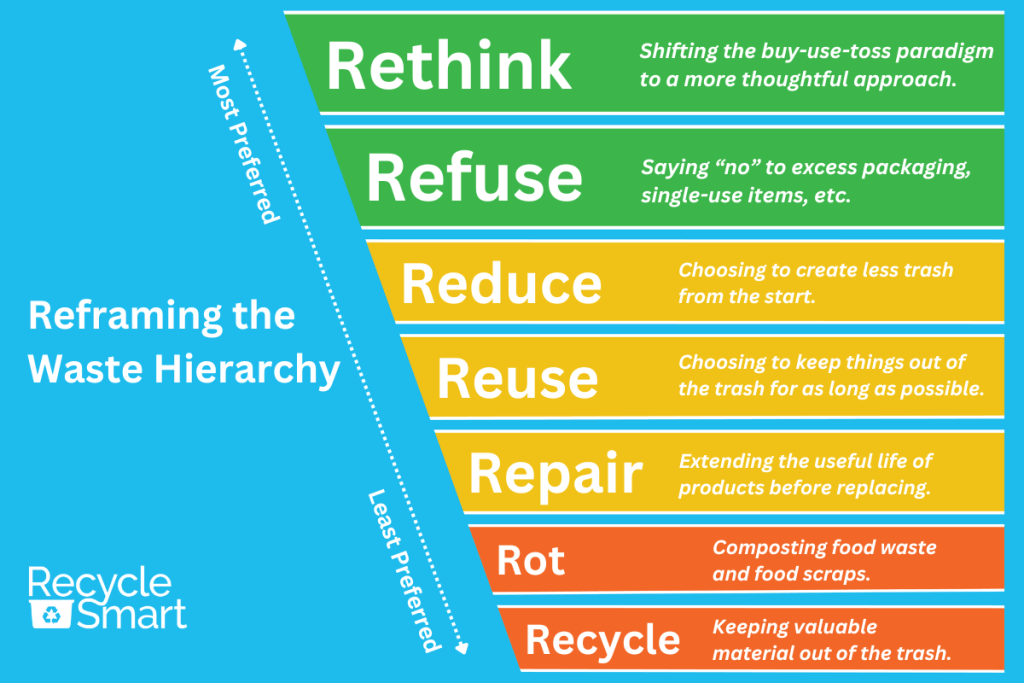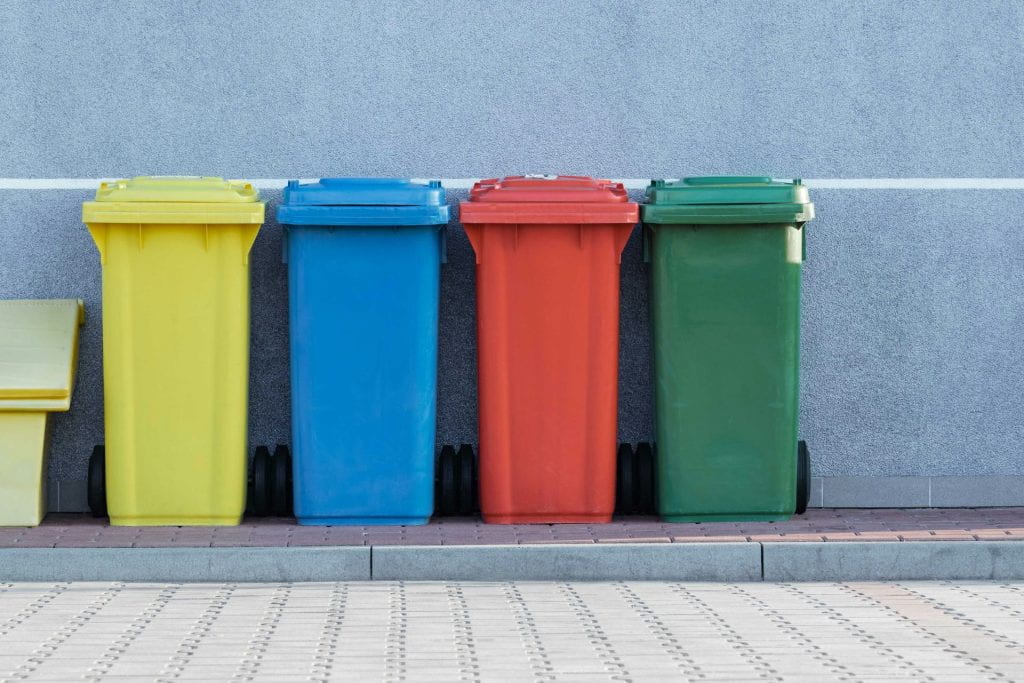Below you will find a collection of resources to help you navigate places in St. Louis that take specific types of materials for reuse, repurposing, or in some cases, recycling.
What to do with university-owned “stuff”
Before you get too far along, please note that there are specific ways to manage materials that are generated through university operations or are owned by the university. Check out this resource for hazardous and nonstandard materials that we frequently field questions about:
Hazardous & Nonstandard Materials | Sustainability | Washington University in St. Louis
Residential Recycling
For all your personal non-standard materials, or if you want to go above-and-beyond when managing waste from your office or storage space, here are some excellent resources that make up the dynamic ecosystem of reuse, repair, repurpose, and recycling in our region! Keep in mind, many of these avenues create jobs, fuel the creative reuse and crafts sector, and provide materials to people in need.
Saint Louis City Recycles
Saint Louis City Recycles offers the “Recycle Beyond Your Blue Bin” database that informs you of what items can and cannot be recycled in your standard residential recycling bin. It also allows you to type in your zip code and find organizations near you that are able to recycle or repurpose the non-standard items.
Some examples of materials that don’t belong in your residential recycling bin but may have an alternative option to the landfill include:
- Automotive: anti-freeze, auto parts, bike tires, brake fluid, car batteries, engine degreasers, hydraulic fluid, motor oil, radiators, road flares, tires, transmission fluid
- Batteries (rechargable batteries of all types, and anything but alkaline disposable batteries.)
- Construction materials: brick, carpet, ceiling/ceramic tiles, concrete, construction debris, drywall, flooring, light fixtures, lumber, mattresses, office furniture, paint, pvc pipe, shingles, wood & wood furnishings
- Electronics: audio equipment, boomboxes, cables, calculators, cell phone accessories, curling irons, digital camera, game consoles, ink cartridges, medical equipment, microwaves, office machines, power tools, projectors, record players, scanners, small appliances, cell phones, vacuums
- Garden: Christmas trees, compost, plastic hanging baskets
- Home Supplies: Aerosol cans, animal/pet supplies, arts and crafts, baby products, beads, bicycles, carpet, carpet padding, cookware, eyeglasses, glue sticks, hair spray, hair dye, jewelry, lighter fluid, metal clothes hangers, nail polish, pantyhose, ornaments, packing/shipping supplies, plastic buckets, shoes
Try the St. Louis Recycles database to find where you can take the materials above for reuse or safe disposal.
Local Agencies Accepting Donations
Whenever you are donating to a local non-profit or reuse project, help them keep their process profitable or extend their limited non-profit dollars by being a mindful and respectful donor! Keep these tips in mind:
- Only donate types of items or materials that the organization has requested or approved
- If a condition is specified, respect the parameters
- Don’t drop donations and run – only drop off items at the designated place, during designated times
Check out this spreadsheet to get a sense of different organizations that may be accepting specific types of materials. Here are some other organizations complied by earthday365.
COMMON Materials Management by Category
Clothing & Textiles
- Dry cleaning/metal hangers can often be returned to the dry cleaners for reuse.
- Fabric Remains | Perennial STL | STL Teacher Trading Post
- Fully wearable clothing MERS Goodwill | Society of St. Vincent de Paul
- Yarn Library at Kingshighway Library (SLPL)
Skincare, makeup, hygiene etc.
- General hygiene products Nordstrom BEAUTYCYCLE
- Makeup products and packaging Nordstrom BEAUTYCYCLE
- New and unopened diapers, baby supplies etc. Almost Home | St. Louis Area Diaper Bank
- New and unopened period products St. Louis Area Diaper Bank
Office/Art Supplies
- Cartridge Ink Recycling Ink Cartridges at WashU
- Office & Art supplies St. Louis Teachers’ Recycle Center | Crime Victim Center | KidSmart | WashU’s Office Supply Exchange
- Paper Perennial STL| PROSHRED Paper Shredding
Furniture, Appliances, Flooring etc.
- Appliances Habitat for Humanity | Society of St. Vincent de Paul
- Furniture Society of St. Vincent de Paul | Home Sweet Home | Win Warehouse
- Tiles, wallpaper, wood, flooring etc. Perennial STL, REFAB , Habitat for Humanity
Miscellaneous
- Batteries The Home Depot | Lowe’s
- Glass bottles: while glass bottles CAN go in your single stream recycling, taking them to the NEW Ripple Glass drop off enables them to be upcycled into new glass bottles rather than downcycled into fiberglass and construction fill. This is a good example of highest and best use!
- Electronics MRC
- Kitchen items Perennial STL | Society of St. Vincent de Paul | Home Sweet Home
- Lightbulbs/holiday lights Holiday Lights Recycling (can also be recycled with ewaste).
- Prescription medicine & medical supplies P2D2 | STL Help
- Wine corks ReCORK | Total Wine & More (Brentwood)
Food Composting
If you’ve made it this far in our article, you probably already acknowledge that there is no “away” just because we package things up and send them to the landfill. Taking additional effort to engage in responsible materials management reminds us of the value of materials and will hopefully inspire us to create less waste in the first place by consuming less.

